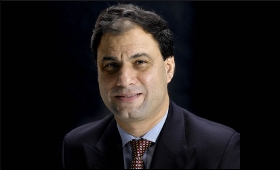|

|
Tax law change 'scaring' overseas investors: Karan Bilimoria
|
|

|
|
| Top Stories |
 |
|
|
|
Gyanendra Kumar Keshri | 17 Apr, 2012
The Indian government's move to amend a law retrospectively to tax
global merger and acquisition transactions involving Indian assets is
"scaring" foreign investors and might hit fund flows from overseas,
believes Lord Karan Bilimoria, the London-based entrepreneur, who is
part of Prime Minister Manmohan Singh's Global Advisory Council and
president of the UK-India Business Council.
Bilimoria is also founder and chairman of Cobra Beer. In an interview he speak to Gyanendra Kumar Keshri in New Delhi recently.
Excerpts of the interview..
In
the 2012-13 budget presented last month, Finance Minister Pranab
Mukherjee proposed to amend the 1961 Income Tax Act retrospectively to
allow authorities to tax global merger and acquisition transactions
involving Indian assets and shares. The amendment, if and when passed by
parliament, will bring into the tax net overseas transactions like
Vodafone-Hutchison. According to the government estimates, such cases
have tax implications of around Rs.40,000 crore. How much this has scared the foreign investors?
Lord Karan Bilimoria: The
moment you start doing retrospective changes and saying I am going to
go back 50 years, I can't tell you how much that has scared foreign
investors. It is a very dangerous thing for countries like India which
need foreign money to boost growth.
Investors from across the
world are concerned over the proposed tax amendment and it might deter
some big ticket overseas investments.
Faith in the rule of law is crucial. Such kind of things will definitely hurt confidence in the system.
The
government moved after the Supreme Court rejected the IT department's
Rs.11,000 crore (USD 2.2 billion) tax demand on the USD 11-billion
Vodafone-Hutchison deal, saying Indian tax authorities do not have
jurisdiction over overseas transactions. However, the finance minister
has clarified that the proposed amendment is not vindictive or targeted
at any particular company but aimed at preventing the erosion of
revenue. What is your said on this?
Lord Karan Bilimoria: You
can perfectly understand his (finance minister) argument why he wants
to change the rules. He does not want India to be a tax haven. But don't
do it retrospectively. Do it looking ahead, say from now onwards if
such a situation arise we will levy tax on you.
The issue of
Vodafone tax row will be discussed prominently at the annual UK-India
round table to be held at Oxford later this month.
Would
the UK-India Business Council along with other business associations
continue to put pressure on the Indian government to push forward the
economic reforms and not to make any retrospective changes in
legislation that would harm investment?
Lord Karan Bilimoria: At the
upcoming meeting our main focus will be on reforms. Unfortunately and
disappointingly, there has been real lack of reforms. It is holding
India back.
I think...to achieve a double-digit growth India
needs to push forward the reforms in the areas like retail, insurance,
banking and labour.
The growth rate of 6.9 percent would be
considered fantastic from the point of view of the US, the UK or other
advanced economies. But it is not sufficient for countries like India,
who need to pull millions of people out of poverty.
India's
economic growth is projected to slow to 6.9 percent in 2011-12 as
compared to 8.4 percent growth registered in the previous year. The
government targets 7.6 percent growth in the current financial year. How
you see the India-UK business in this arena?
Lord Karan Bilimoria: On
India-UK business relations...the governments of the two countries need
to further liberalise policies to boost investments and trade and
enhance people-to-people contacts.
The last major step towards
liberalisation in the economic policy between the two countries was of
opening up the airlines sector. Opening up of aviation sector between
the two countries has really helped each other. The number of
travellers, both business and tourists, has rocketed mainly because now
it's so easy to travel. Earlier there were just two airlines - Air India
and British Airways; now you have several.
|
|
|
| |
|
|
|
|
|
|
|
|
|
|
|
|
|
|
| |
| Customs Exchange Rates |
| Currency |
Import |
Export |
US Dollar
|
66.20
|
64.50 |
UK Pound
|
87.50
|
84.65 |
Euro
|
78.25
|
75.65 |
| Japanese
Yen |
58.85 |
56.85 |
| As on 13 Aug, 2022 |
|
|
| Daily Poll |
 |
 |
| PM Modi's recent US visit to redefine India-US bilateral relations |
|
|
|
|
|
| Commented Stories |
 |
|
|
|
|
|
| |
|